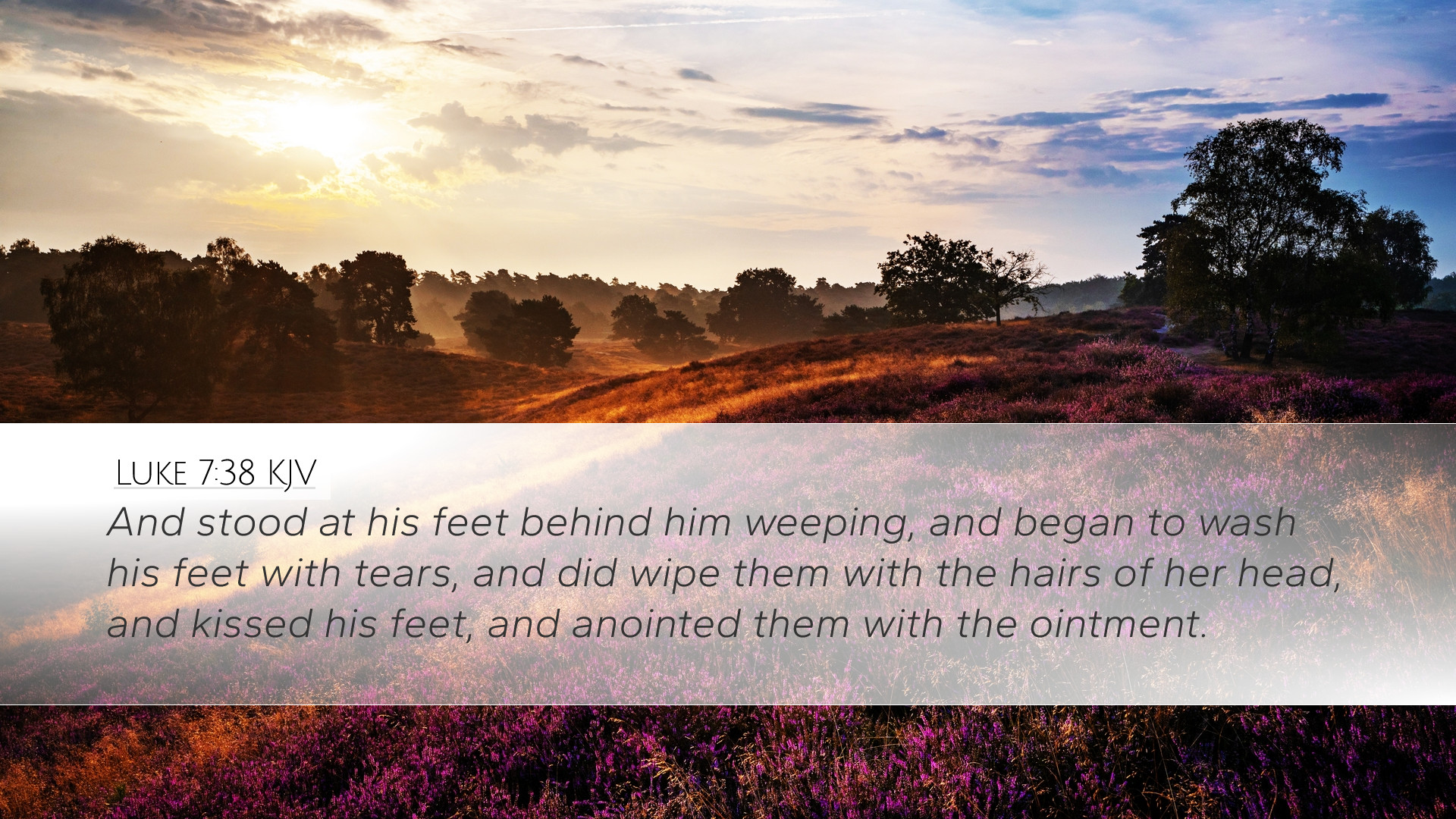Commentary on Luke 7:38
Luke 7:38 recounts a poignant moment in the life of Jesus, illustrating themes of repentance, love, and forgiveness. This verse captures the essence of an encounter between a sinful woman and the Lord, offering rich insights for pastors, students, theologians, and scholars.
Text of Luke 7:38
"And stood at his feet behind him weeping, and began to wash his feet with tears, and did wipe them with the hairs of her head, and kissed his feet, and anointed them with the ointment."
Context and Background
The context of this verse is crucial for understanding the depth of the woman's actions. It takes place during a meal at the house of Simon the Pharisee, where Jesus is being entertained. The contrast between the self-righteousness of Simon and the humility of the woman establishes a tension that underlines the teachings of Jesus on mercy and forgiveness.
Insights from Public Domain Commentaries
Matthew Henry's Commentary
Matthew Henry emphasizes the significant display of love and humility exhibited by the woman. He notes that her tears represent profound repentance, and each action taken reflects her deep remorse and recognition of her sinfulness.
- Weeping: Her weeping signifies the sorrow for her sin, suggesting a cathartic recognition of her need for mercy.
- Washing with Tears: The act of washing Jesus' feet with her tears signifies her humble acknowledgment of His Lordship and her own unworthiness.
- Wiping with Hair: Henry indicates that this action reveals her willingness to lower herself, traditionally reserved for serving, thus symbolizing a complete submission.
- Kissing His Feet: The act of kissing denotes affection and reverence, capturing the essence of her heartfelt devotion.
- Ointment: The anointing with ointment serves as a physical representation of her gratitude and love towards Jesus, highlighting the value she places on His presence.
Albert Barnes' Notes on the Bible
Albert Barnes provides a detailed exploration of the woman’s actions, illustrating the cultural and spiritual ramifications of her behavior. He suggests that her boldness in entering a Pharisee's home reflects a profound desperation for forgiveness.
- Cultural Significance: Barnes explains that in Jewish society, a woman of her reputation would typically be shunned, making her approach to Jesus countercultural and radical.
- Demonstration of Faith: The woman's actions are not merely acts of contrition but manifestations of her faith in Jesus' ability to forgive, showcasing her understanding of the grace He represents.
- Contrast with Simon: Barnes highlights the contrast between Simon's cold reception of Jesus and the woman's passionate engagement, inviting readers to reflect on their own responses to Christ.
Adam Clarke's Commentary
Adam Clarke interprets the verse with a focus on the symbolism of the woman's acts. He delves into the emotional and spiritual significance of each gesture, revealing layers of meaning often overlooked.
- Symbolism of Tears: Clarke notes that tears in Scripture often symbolize deep emotional pain and the cleansing power of contrition.
- Wiping with Hair: This act is significant, as in Jewish culture, a woman's hair was her glory; using it to wipe Jesus' feet symbolizes her ultimate act of surrender and humility.
- Kissing: The kiss represents an intimate acknowledgment of Jesus as the Messiah, an act laden with affection and surrender to divine authority.
- Use of Ointment: Clarke elucidates that the ointment is indicative of her treasured possession, thereby showing that her worship cost her something valuable, embodying true sacrifice in devotion.
Theological Implications
The actions of the sinful woman raise profound theological implications about redemption and the nature of God’s grace. The passage emphasizes the following themes:
- The Nature of Repentance: True repentance is characterized by deep sorrow for sin, which leads to tangible expressions of love and gratitude.
- Jesus' Acceptance of Sinners: This encounter demonstrates Jesus’ openness to those whom society deems undeserving, reinforcing the message of inclusive grace.
- Faith and Works: The passage illustrates the relationship between faith and works, as genuine faith is always accompanied by acts of love and service towards God.
Conclusion
Luke 7:38 serves as a powerful reminder of the transformative nature of encountering Christ. The sinful woman's actions encourage believers to embrace humility, express heartfelt repentance, and demonstrate love for Jesus through acts of service. This commentary, drawing from rich public domain sources, aims to deepen the understanding of this scripture for pastors, students, and scholars alike, inviting all to reflect on their relationship with God and the radical love He offers to each of us.


